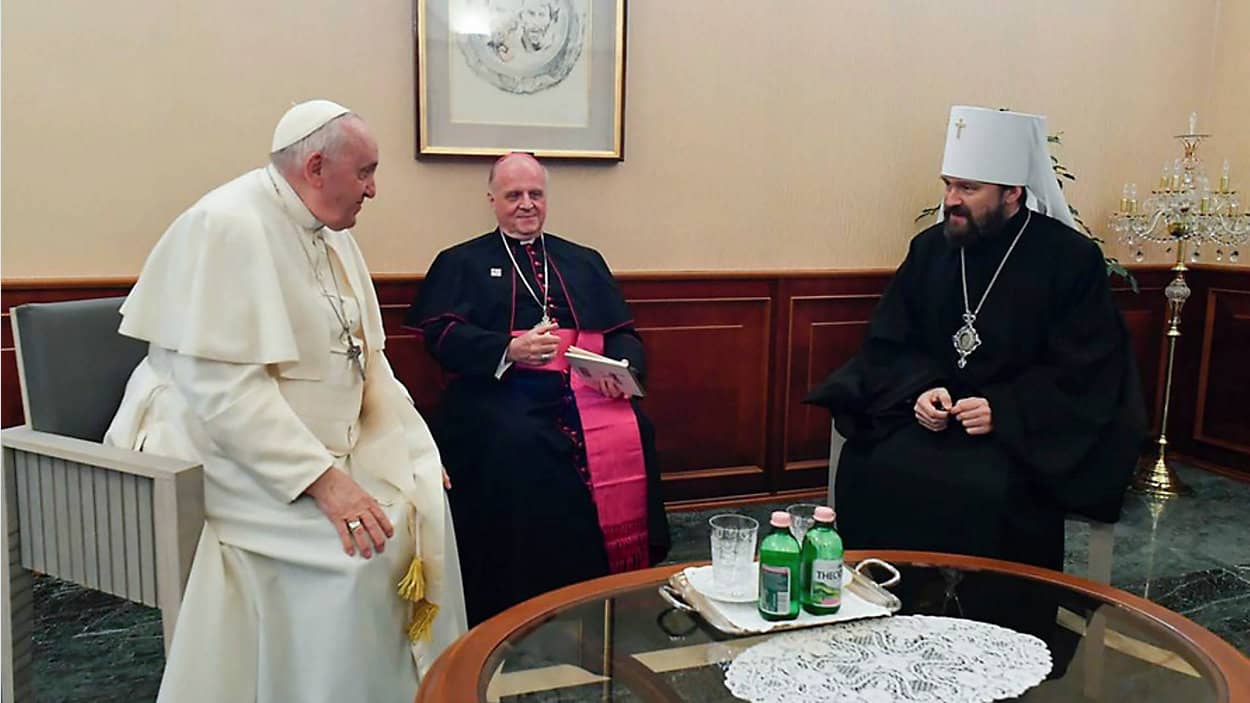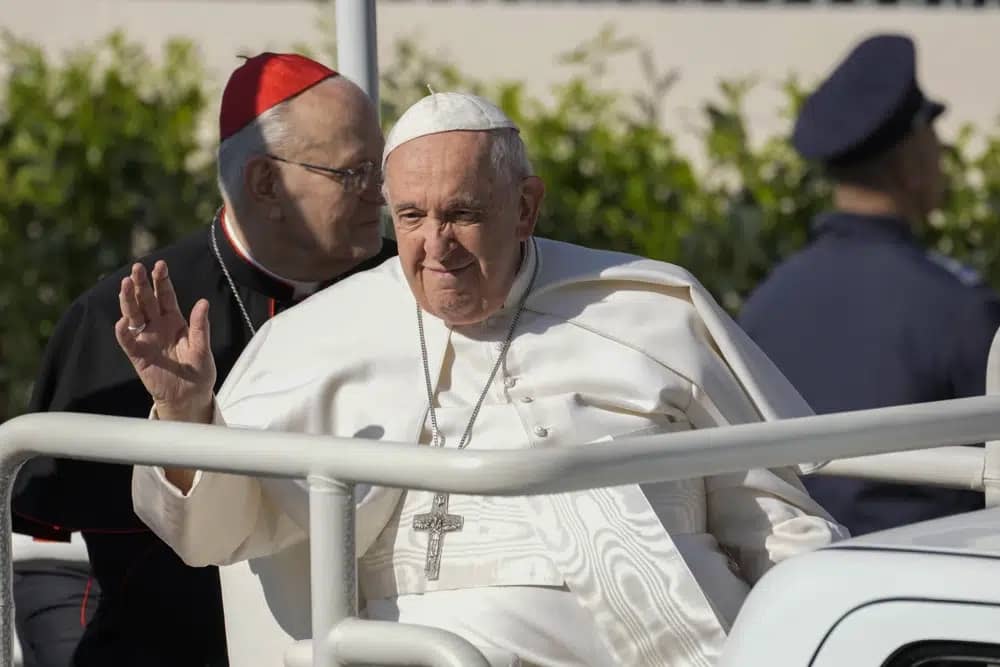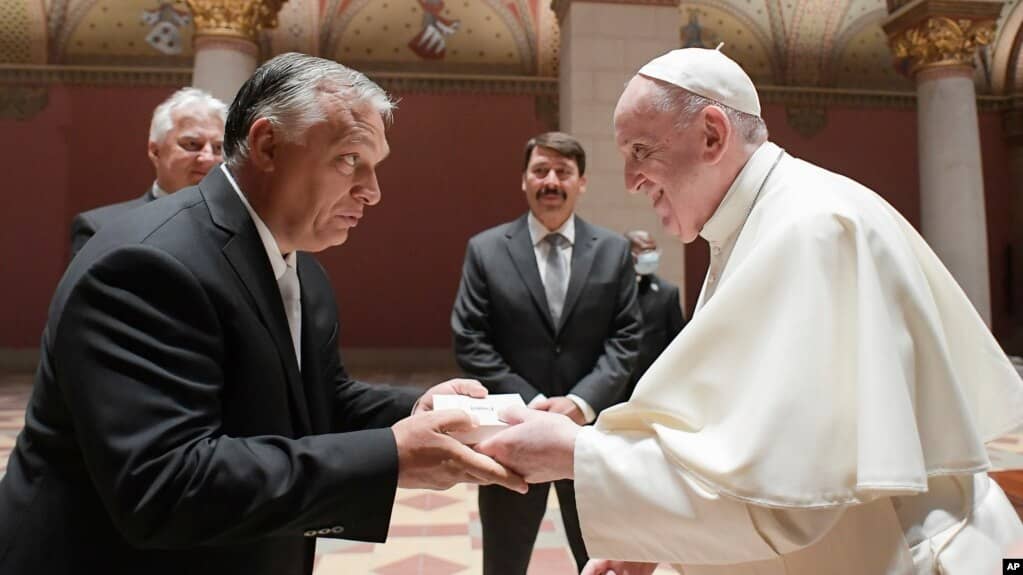BUDAPEST – On his second day in Hungary’s capital, Pope Francis met a group of poor people and refugees, including several who fled the war in neighboring Ukraine, and urged society to let go of selfish indifference toward those in need.
Speaking before an estimated 600 people inside St. Elizabeth of Hungary Church, as well as another 1,000 gathered outside, the pope stressed the importance of charity, saying, “Even amid pain and suffering, once we have received the balm of love, we find the courage needed to keep moving forward.”
When those who are struggling are treated with love and compassion, “We find the strength to believe that all is not lost, and that a different future is possible,” he said.
“The love that Jesus gives us and commands us to practice can help to uproot the evils of indifference and selfishness from society, from our cities and the places where we live, and to rekindle hope for a new, more just and fraternal world, where all can feel at home,” he said.
Despite a demanding schedule, Pope Francis seemed in good form on the second day of his weekend outing to Hungary. He arrived for most events Saturday in a wheelchair, as has become his custom due to his sciatic nerve condition and chronic knee problems, but walked during much of the day Friday, including descending the steps of the Budapest cathedral. He appeared alert and engaged, and delivered his public remarks without difficulty.
Francis spoke Saturday in a country whose Prime Minister Viktor Orbán once described himself as “an anti-immigration politician.”
Shortly after arriving to Budapest Friday, the pope, a staunch advocate of an open-door migrant policy, met privately with Orbán and Hungarian President Katalin Novák before delivering a speech to national authorities in which he said the Christian attitude is one of welcome and acceptance to migrants and those in need.
RELATED: Pope lands in Hungary rallying for a unified, welcoming Europe
Yet despite Hungary’s broad resistance to so-called “illegal migration,” the country has been generous in welcoming Ukrainian refugees.
Hungary shares roughly 85 miles of border with Ukraine and maintains close ties to the nearly 150,000 ethnic Hungarians living in western Ukraine. Since Russia’s invasion last February, Hungary has welcomed over a million Ukrainians. Most have moved on, but around 35,000 have stayed and sought residency or another type of official status.
During Saturday’s meeting the pope heard several testimonies, including a woman named Brigitta who fell into poverty and had difficulty supporting her children alone, as her husband had become an alcoholic. She said the Greek Catholic Church, Ukraine’s largest Catholic grouping, stepped in and offered help just before her children were taken away.
Pope Francis also heard from a Ukrainian family with five children who fled their city of Dnipro in Ukraine in May 2022 when bombing began and the situation became dangerous. The father, Oleg, said he had worked as a cook in Hungary several decades prior, so the family decided to travel to Budapest and were supported by a stipend from Caritas Hungary, which helped them make a new start.
He heard a third testimony from a couple who also have five children, and who opened a soup kitchen to assist the poor and homeless in Budapest. Refugees hailing from Ukraine, Pakistan, Afghanistan, Iraq, Iran, Nigeria, and South Sudan, and other countries were on hand, along with several people with various disabilities.
In his speech, Francis said contact with the poor and needy provides a challenge to Christians in that “we must refuse to let the faith we profess be imprisoned by a piety removed from life, one that results in a kind of ‘spiritual egotism,’ a spirituality of my own creation that serves to preserve my own inner tranquility and complacency.”
True faith, he said, means taking risks and learning to speak “the language of charity,” especially to those in need.
He pointed to the example of Saint Elizabeth of Hungary, a princess who grew up in wealth and comfort but who sold her possessions and spent her life in service of the poor.
Pointing to Brigitta’s testimony and the help she received from the Greek Catholic Church, Pope Francis said “That is the kind of witness we are asked to give: showing compassion toward all, especially those experiencing poverty, illness and pain.”
“We need a Church that is fluent in the language of charity, that universal language which everyone can hear and understand, even those farthest from us, even those who are not believers,” he said, and thanked Hungary for its commitment to charitable work carried out by various organizations and communities.
He also thanked the country for its welcome “with generosity but also with enthusiasm” of so many refugees from Ukraine, saying the hospitality Oleg and his family experienced upon their arrival is characteristic of Hungarian society.
“The memory of love received rekindles hope and inspires people to embark upon a new journey in life,” he said, saying this love often gives hope for a new life and a new future.
Francis lamented the poverty and homelessness experienced by many Hungarians and praised the work of the couple who opened the center for the poor, which assists not only homeless and the impoverished, but also those who have various disabilities and who have recently been released from prison.
“This is a lesson for the whole Church: it is not enough to provide bread to fill stomachs; we need to fill people’s hearts,” he said, saying the practice of charity “is much more than material and social assistance. It has to do with the whole person; it strives to put people back on their feet with the love of Jesus: a love that helps them to recover their beauty and their dignity.”
Pope Francis closed his speech urging Hungarians “always to speak the language of charity.”
“Whenever you strive to offer bread to the hungry, the Lord makes joy blossom within you and infuses your life with the fragrance of the gift of love that you give. My hope and prayer, then, is that you will always spread the fragrance of charity in the Church and in your country,” he said.
Prior to meeting with poor people and refugees, the pope made a private visit to the Blessed László Batthyány-Strattmann Institute, which assists disabled children. It was founded in 1982 by Sister Anna M. Fehér, a visually impaired member of the Sisters of St. Elizabeth who was dubbed the “Mother Teresa of Hungary” before her death in 2021. The center serves children who are visually impaired or who have developmental difficulties, many of whom sat in wheelchairs to greet Francis Saturday morning as the pontiff himself arrived and exited in a wheelchair as well.
Following his meeting with the poor and refugees, the pope was scheduled to meet with the Greek Catholic community in Hungary, which numbers around 300,000 and is served by three bishops.
The meeting was a last-minute addition to his schedule and is significant given that the Greek Catholic Church constitutes the bulk of Catholicism in neighboring Ukraine, and has been on the front lines in providing material and spiritual aid to those impacted by the war with Russia.
Follow Elise Ann Allen on Twitter: @eliseannallen












